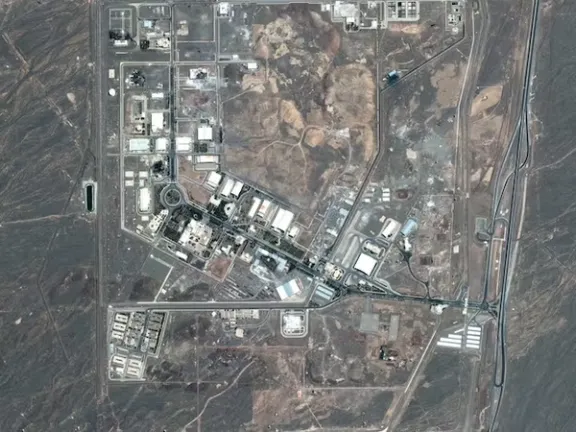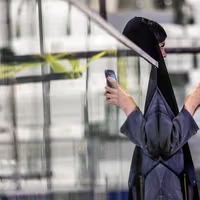Iranian Football Fans Defy Minute Silence For Slain Commanders
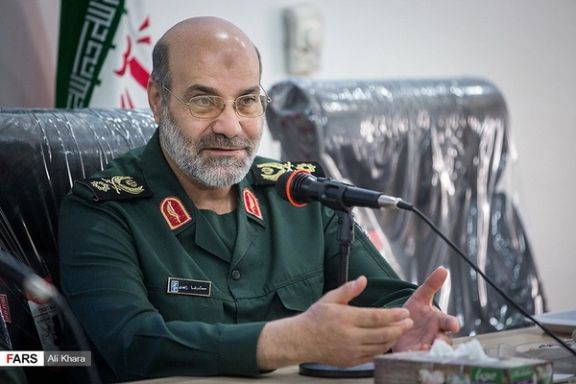
Iranian football fans disregarded a regime directive calling for a minute of silence for top Revolutionary Guard Quds Force commanders killed by Israel in Damascus.

Iranian football fans disregarded a regime directive calling for a minute of silence for top Revolutionary Guard Quds Force commanders killed by Israel in Damascus.
During a match in Tehran, fans turned the moment into a minute of boos and jeers by blowing horns and shouting, a gesture captured on video that swiftly spread across social media platforms.
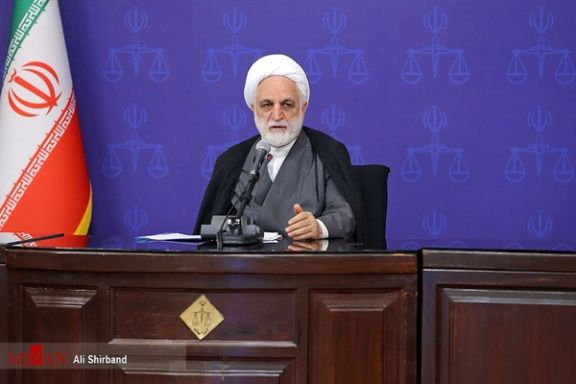
Gholamhossein Mohseni Ejei, the head of Iran's judiciary has called for stronger implementation of hijab laws amid ever rising oppression in Iran.
Speaking on Sunday, Ejei emphasized the need for better utilization of existing laws by law enforcement, the Ministry of Interior, and the judiciary to enforce hijab, suggesting that more than “70% of the problems could be resolved through proper enforcement.”
The remarks come shortly after a speech by Ali Khamenei, the Supreme Leader of Iran, to officials where he reiterated the importance of compulsory hijab for women.
The legislative efforts surrounding hijab have been contentious. A bill, initially drafted by the government and later revised by hardline factions in parliament, proposed penalties including heavy fines for women not adhering to the prescribed Islamic dress code.
Amirhossein Bankipour, an MP supporting the compulsory hijab law, announced adjustments to address shortcomings in the bill, signaling its progression for final approval.
Meanwhile, voices within religious circles have urged for further hijab enforcement. Mohammad Javad Fazel Lankrani, a member of the Society of Seminary Teachers of Qom, condemned the defiance of hijab as a "sinister conspiracy" and said the Islamic hair covering is beyond personal choice.
International scrutiny over Iran's mandatory hijab laws has intensified, with human rights experts from the United Nations expressing concerns over systematic discrimination against women.
Amnesty International criticized the enactment of a three-year experimental period for the mandatory hijab law, denouncing it as a violation of women's rights.
Despite the government's efforts to suppress dissent, civil disobedience against compulsory hijab has grown, particularly since the controversial death of Mahsa Amini in 2022 which led to the Women, Life, Freedom uprising.
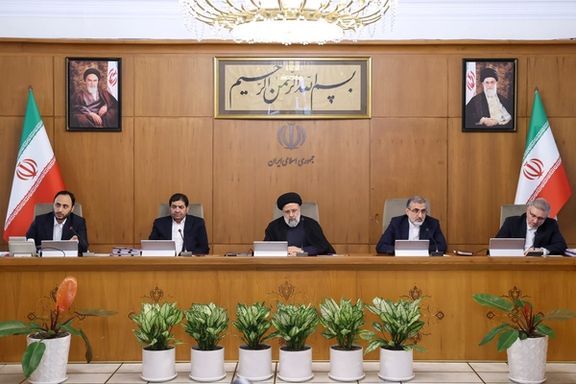
A prominent newspaper in Tehran has criticized the government for its lack of an economic plan in the final year in office for President Ebrahim Raisi, whose first term has been marred by multiple crises.
Etemad daily reported last week that the budget bill for the current year received only partial approval from the parliament, a situation unprecedented in Iran. The approval process saw the bill exchanged between the government, parliament, and Guardian Council multiple times over several months. Even when partially approved, the bill required over 20 revisions in a single day. Notably, the parliament granted the government permission to utilize an "on account" budget before receiving full approval from the Guardian Council.
Describing the new Iranian year (1403, which began on March 20) as "a year without a plan," Etemad highlighted the uncertainty faced by the government regarding its budget allocation. Additionally, the government lacks clarity on which areas and sectors it can allocate funds to using the on-account budget. The parliament has pledged to provide clarification on this matter in April and May.
In practical terms, Etemad noted that the government has only received guidance on the first two months of the year from the parliament. However, there are no established laws or regulations governing the on-account budget and how parliament can oversee its spending.
The government’s own news agency, IRNA, has said in a commentary that this kind of unplanned budgeting will certainly lead to higher inflation. Former Lawmaker Gholam Ali Jafarzadeh Imanabadi concurred with IRNA and said the government cannot be happier about spending the budget without any legislative supervision.
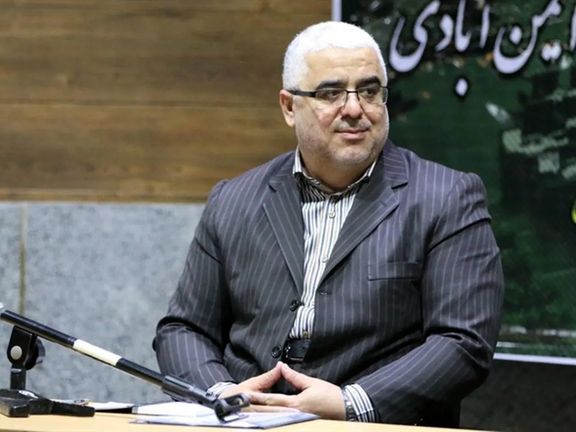
Imanabadi criticized the lack of clarity, stating, "It's regrettable that no one knows how much budget the government has for the current year." He sarcastically added, "The Majles can only supervise the way people keep their pets and walk their dogs," referring to ever-more stringent Islamic regulations.
According to Etemad, a preliminary version of the budget bill sets the annual budget of Iran at 60,479 trillion rials, which is slightly more than $100 billion after the national currency fell 30% in the past three months. Government-owned companies allocated around 37,000 trillion rials and the government’s operation budget 27,000 trillion rials.
Etemad emphasized the absence of both a budget and a plan for spending, despite the presence of the Planning and Budget Organization in Iran.
In his New Year's Day speech, President Raisi claimed, without evidence, that the inflation rate in Iran is decreasing. However, Iran International TV reports a 40 percent increase in housing costs over the past year, with Tehran experiencing a rise of over 50 percent during the same period.
Jailed sociologist Saeed Madani had said earlier that widespread economic problems were part of the underlying crises in Iran during the past year which have led, among other things, to a rise in emigration of educated Iranians and brain drain, and a decline in the turnout in the country's recent elections.
Avaz Heidarpour, a medical doctor and a former lawmaker, told Khabar Online that some 10,000 medical staff have left Iran in the past three years saying that they need welfare for their families and hope for their children.
Outlining the importance of economic issues in social movements, sociologist Ahmad Bokharai told Khabar Online: "The protests in 1999 and 2009 were political in nature while the ones in 2017 and 2019 had economic reasons. What happened during the 2022 protests was a revolt with combined political, economic and cultural motivations.
In an interview with Etemad, lawmaker Ahmad Alirezabeigi likened the partial approval of the budget bill by the Majles to "drinking a cup of poisonous hemlock," indicating it was an unavoidable action. This suggests it may have been directed by none other than Supreme Leader Ali Khamenei as a solution to the political impasse between the government, the parliament, and the Guardian Council.
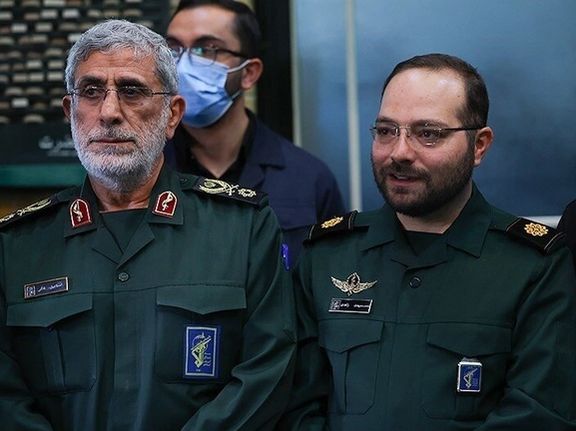
The son of the Iranian Revolutionary Guard commander killed by an Israeli airstrike in Syria said the family will not seek vengeance if the Supreme Leader does not call for it.
In spite of Ali Khanenei’s immediate call for action following the last week strike on Iran’s consulate in Damascus, Mohammed-Reza Zahedi’s son, Mohammad-Mehdi -- himself an IRGC major -- said, "We will find reassurance in whatever Khamenei says about revenge, whether it be avenged or not, and we will obey it”.
An unconfirmed, single-sourced report is alleging that Tehran promised Washington it would not retaliate to last week’s Israel’s airstrike if Israel accepts a ceasefire in Gaza.
However, in a message released last week, Khamenei said, “The nefarious regime will be punished by our brave men. We will make them regret this crime and other ones like it, by God's will.”
The attack which also killed six others, has left Tehran grappling with its response. President Ebrahim Raisi convened an emergency session of Iran's National Security Council, but no concrete actions have been announced so far.
Iran has appealed to the UN Security Council condemning Israel's actions in a letter delivered by the nation's deputy representative to the United Nations.
However, apart from diplomatic efforts and ceremonies honoring the fallen officers, Tehran has refrained from further measures.
While some within the Revolutionary Guard circles advocate for a harsh retaliation, others, including Friday Imams, urge caution and "strategic patience."
The prospect of a direct conflict with Israel raises concerns within Iran's political and military establishment, particularly given the nation's already weakened economy.
Already, the currency rial has fallen by 30 percent since early January, and now stands close to 650,000 to the US dollar.

Legal action is being taken against at least one student after hardliners in Iran expressed outrage over a video of female students dancing in their graduation celebration video, which went viral this week.
The students from Al-Zahra University in the southern city of Bushehr were also seen dancing in public and riding motorcycles, activities that are illegal for women in Iran with the hardline government cracking down ever harder on women’s freedoms from behavior to dress codes.
Zahra Hajiani, the dean of Al-Zahra University, responded to the video, stating that university security forces were investigating the incident.
In an interview with the Iranian Students News Agency (ISNA), Hajiani said that “no official graduation ceremony had been held at the university due to the COVID-19 pandemic and financial constraints.”
She added that “the video was organized independently by a few graduating students without coordination or permission from the university.”
Hajiani announced that the university is currently investigating the matter, and the student responsible for filming the video has been identified.
Labeling the graduation celebration as "illegal," Hajiani asserted that the university administration would pursue legal action.
The incident underscores the ongoing crisis surrounding the mandatory hijab and women's social freedoms in Iran.
Iran imposes its interpretation of religion on women through judicial rulings and heavy penalties, restricting their right to choose their clothing and lifestyles. Despite increasing civil opposition, particularly evident after the protests of 2022, social restrictions on women have deepened from covert surveillance to increased morality police patrols and arrest.
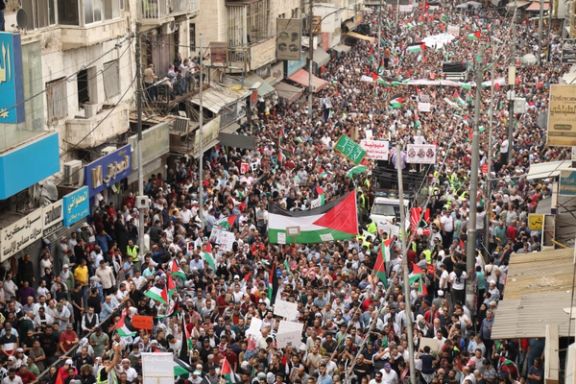
The Islamic Republic of Iran is stoking violent discontent against the Hashemite Kingdom, with a view toward gaining control over Jordan as part of an expanded “Shiite Crescent.”
A new April analysis by the US-based Middle East Media Research Institute (MEMRI) of the pro-Hamas demonstrations on the streets of Amman sounded the alarm bells about the role of Iran’s revolutionary Islamic ambitions in Jordan.
According to the report authored by Ayelet Savyon, the Director of the MEMRI Iran studies project, “In recent days, the grand Iranian plan is emerging – the plan with which the Islamic revolutionary regime is continuing despite the killing, in Israeli air strikes, the senior command of its IRGC Qods Force in Syria and Lebanon. The upcoming stage of this plan involves bringing down the regime in Jordan, attacking Israel from the east while Israel is kept busy by Iran-backed resistance forces in Lebanon, Syria, and Gaza. The political aim of this plan is to thwart the Saudi-American project of normalization with Israel.”
She added that “Next in Iran’s sights is the expulsion of American forces from Iraq, and the undermining of the Saudi Kingdom and the Egyptian regime, as Iran actualizes the vision of Islamic Revolution.”
She warned that “It is not clear whether the US administration, which is currently preoccupied with the IDF’s tragic mistaken killing of the World Central Kitchen charity workers, is aware of events that could impact the continued US presence in the region as well as America’s international standing.”
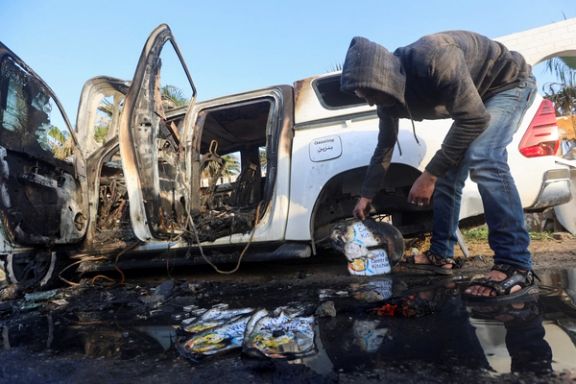
On Saturday, Iran International reported that the Tehran-backed Iraqi Hezbollah battalions are prepared to arm and equip 12,000 fighters of “the Islamic resistance” in Jordan. The Iranian regime-controlled news agency ISNA stated Iranian-backed proxies will supply the 12,000 combatants in Jordan.
Dr. Walid Phares, an expert in foreign policy and the author of Iran, an Imperialist Republic, and US Policy, told Iran International “What is happening in Jordan now, while it appears as chaotic, is in fact tightly organized by Hamas, the larger Muslim Brotherhood network and the Iran regime. The protests against the Israeli embassy and spill over in Amman's streets are the result of tightly coordinated moves by the Iran and Ikhwan [the Arabic term for Muslim Brotherhood] networks, with the real target being the Hashemite Kingdom itself. “
The Gaza-based Hamas movement, the Palestinian branch of the Muslim Brotherhood, is a potent ally of Iran’s regime. The former Muslim Brotherhood president of Egypt, Mohammed Morsi, worked to rekindle relations with the Islamic government of Iran.
Phares, who served as a national security advisor to US Presidential nominees, added, “Tehran always considered the kingdom as an advanced US ally in the region threatening the Iranian militias in Syria and Iraq, and a forward base for US and allied troops in the region. In fact, American and British troops have bases in Jordan that support Coalition activities in the whole region. Remember that the pro Iran militias have targeted a US base on the Jordanian border with Syria.”
The Mideast expert said, “Hence we know that Tehran and Damascus have been targeting the Hashemite kingdom for years and now it looks like they've unleashed their supporters against the regime.”
“The problem seems to be in Washington because of foreign policy decisions since the catastrophic withdrawal from Afghanistan. It was a cascade of encouragement to jihadists and pro-Iranian forces. Jordan is getting close to a possible large domestic clash caused by Hamas, Iran, and a result of an administration that put a transaction with the Iran regime above the national security interest of America and the stability of its direct allies in the region,” Phares said.
Former Israeli Ambassador Jordan, Jacob Rosen, who lived in Jordan for nine years, told Iran International that Iran has been many years “trying to push their way” into Jordan. He said “in south Jordan in Karak there is a holy grave for the Shiites.” He added “They [the Iranians] are always pushing Jordan to open the borders to bring tourism. The Jordanians resist the idea because they know what it means.”
The town of Mu'tah in the Karak Governorate was the location of a famous battle in 629 CE between Arab Muslims and Christians. A cousin of the Prophet Muhammad, Jaʿfar ibn Abī Ṭālib, was killed during the battle.
Rosen pushed back against the oft- cited Western journalistic narrative that Jordan is a fragile country. He said many other Arab governments “are soldiering on. What is fragile? There are no beggars in the streets and no hunger. The tribal networks are very strong. “
He added “The Jordanian government and the people are very strong and aware of the challenges. And if they need extra help from other countries, they get it.”
In a January 2024 article titled “Jordan and the Iranian Affiliates Drug Offensive,“ Rosen wrote with his co-author, Shaul Shay, a former deputy head of Israel’s National Security Council, that “In last year Tehran begun to target the Hashemite kingdom of Jordan, one of the main Western allies in the region. Iran and its affiliated terrorist groups are leveraging the war in Gaza to undermine the stability and sovereignty of Jordan and the peace agreement between Jordan and Israel.”
According to the article, “Iran’s presence in Syria and Iraq provides it the ability to penetrate from two directions with proxy forces and Syrian…make it easy to exploit internal divisions. The smuggling of drugs and weapons from Syria to Jordan is seen as an attempt by Iran to expand its influence in the region and destabilize Jordan.”
The Israeli experts stressed that “Given the strategic importance of Jordan in the Middle East, it is imperative to closely monitor Iran’s actions and alliances and supporting Jordan’s stability through diplomatic, economic and military means.”
Last week’s airstrike saw a top commander and six IRGC forces killed in the brazen strike to Iran’s personnel abroad.
The incident echoes a similar occurrence in October, when hundreds of Iranian fans at another football match in Tehran protested against the presence of Palestinian flags on the pitch.
While the Islamic Republic's propaganda machinery orchestrated street celebrations in support of what they termed the "Palestinian victory” after the October 7 invasion of Israel by Hamas, the atmosphere at the football match revealed a different sentiment among Iranian fans.
Chants of "Take that Palestinian flag and shove it up your A**!" were heard, highlighting a divergence from the regime's narrative.
The Hamas attack claimed the lives of 1,200 predominantly civilians, and saw 250 others taken hostage and remains a contentious issue in Iran.
Despite attempts to galvanize public support through organized rallies, ordinary Iranians largely refrained from participating, underscoring the nuanced and diverse nature of public sentiment within the country.
